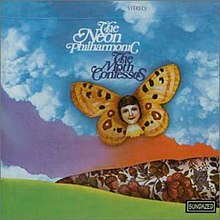The Moth Confesses
| The Moth Confesses | ||||
|---|---|---|---|---|
 |
||||
| Studio album by The Neon Philharmonic | ||||
| Released | 1969 | |||
| Genre |
Baroque pop Sunshine pop Progressive rock Symphonic rock |
|||
| Length | 31:32 | |||
| Label |
Warner Bros./Seven Arts Sundazed Rhino Records |
|||
| Producer |
Don Gant Bob McCluskey Tupper Saussy |
|||
| The Neon Philharmonic chronology | ||||
|
||||
| Professional ratings | |
|---|---|
| Review scores | |
| Source | Rating |
| Allmusic |
Original Release link |
Original Release link
The Moth Confesses is the 1969 debut album by The Neon Philharmonic. Described as "A Phonograph Opera," it was inspired, according to the liner notes, by a production of Samuel Barber's Antony and Cleopatra, which Saussy attended after The New York Times claimed that it was a terrible opera, and wanted to see what a terrible opera looked like, which he surmised was its deliberate attempt to appeal to a one-time audience. In response, he conceived this album as a condensed opera, with a moth-like protagonist, focused on the "literary theme" of desperation. Saussy did not imagine it could be staged like Tommy, but offered it up as a challenge.
"Brilliant Colors" and "Morning Girl" were both released as singles, while "The New Life Out There" was used to promote the record as a contemporary opera in radio advertisements. "Morning Girl" hit #17 on the Billboard Hot 100 chart and was later covered by The Lettermen. Shaun Cassidy covered "Morning Girl, Later" with a few tweaked lyrics (omitting the reference to "Catherine" which complicates the song, implying that the protagonist now has a wife or daughter) and titled it "Morning, Girl." The songs primarily cover the topic of striking out towards a new life when relationships fail for various reasons.
All songs written by Tupper Saussy.
The album was reissued by Sundazed Records in 1995 with six bonus tracks. The six extra songs are noted to be more straightforward than the original songs found on the original album. The liner notes for this album were written by Andy Zax, who later compiled and produced Rhino's 2003 Neon Philharmonic anthology Brilliant Colors: The Complete Warner Brothers Recordings.
...
Wikipedia
